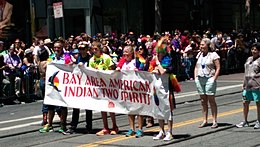after the op in gd about 5 genders, I found these interesting links and hope they are
accurate and useful)
(some useful resource links at bottom)
Two-Spirit
"Berdache" redirects here. For the glaive polearm, see Bardiche.

Two-spirited marchers at San Francisco Pride 2014.
Two-Spirit (also two spirit or twospirit) is a modern umbrella term used by some indigenous North Americans to describe gender-variant individuals in their communities.[1] The term was adopted in 1990 at an Indigenous lesbian and gay international gathering to encourage the replacement of the anthropological term berdache.[2] It is a spiritual role that is recognized and confirmed by the Two-Spirit's indigenous community.[3] While some have found the term a useful tool for intertribal organizing, not all Native cultures conceptualize gender this way, and most tribes use names in their own languages.[2][4] While pan-Indian terms are not always appropriate or welcome, the term has generally received more acceptance and use than the term it replaced.[2]
Third and fourth gender roles traditionally embodied by two-spirit people include performing work and wearing clothing associated with both men and women. Not all tribes/nations have rigid gender roles, but, among those that do, some consider there to be at least four genders: feminine woman, masculine woman, feminine man, masculine man.[3] The presence of male-bodied two-spirits "was a fundamental institution among most tribal peoples"[5] and, according to Will Roscoe, both male- and female-bodied two-spirits have been documented "in over 130 North American tribes, in every region of the continent."[6]
Before the late twentieth-century, non-Native (i.e. non-Native American/Canadian) anthropologists used the generic term berdache /bərˈdæʃ/ to identify an indigenous individual fulfilling one of many mixed gender roles in their tribe, but that term has now fallen out of favor. Anthropologists primarily used it to identify feminine Native men. Its etymology, however, has meant that it is now considered outdated and potentially offensive: it derives from the French bardache (English equivalent: "bardash" meaning "passive homosexual", "catamite"[7] or even "male prostitute". Bardache, in turn, derived from the Persian برده barda meaning "captive", "prisoner of war", "slave".[8][9][10][11] Spanish explorers who encountered two-spirits among the Chumash people called them "joyas", the Spanish for "jewels".[12]
meaning "passive homosexual", "catamite"[7] or even "male prostitute". Bardache, in turn, derived from the Persian برده barda meaning "captive", "prisoner of war", "slave".[8][9][10][11] Spanish explorers who encountered two-spirits among the Chumash people called them "joyas", the Spanish for "jewels".[12]
Use of berdache has generally been replaced by the self-chosen "two-spirit", which, in 1990, gained widespread popularity during the third annual intertribal Native American/First Nations gay and lesbian conference in Winnipeg.[13] Two-spirit is a pan-Indian term chosen to express the Native/First Nations' distinct approach to gender identity and variance in contrast to the imposed non-Native terms of berdache, "gay", "lesbian", and "trans"
. . .
https://en.wikipedia.org/wiki/Two-Spirit
http://www.dancingtoeaglespiritsociety.org/twospirit.php
http://www.nativepeoples.com/Native-Peoples/May-June-2014/Two-Spirit-The-Story-of-a-Movement-Unfolds/
http://nativeout.com/twospirit-rc/two-spirit-101/
http://www.pbs.org/independentlens/films/two-spirits/
http://twospirits.org/
